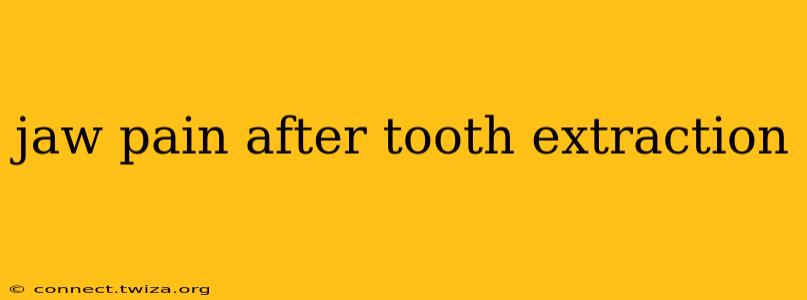Experiencing jaw pain after a tooth extraction is a common occurrence, often causing significant discomfort and impacting daily life. Understanding the causes, effective treatments, and preventive measures is crucial for managing this post-operative complication. This comprehensive guide will address your concerns and provide valuable insights into managing jaw pain following a tooth extraction.
What Causes Jaw Pain After Tooth Extraction?
Jaw pain after a tooth extraction can stem from several factors, all related to the surgical procedure and the body's natural healing process.
- Inflammation: The extraction site naturally swells and inflames as part of the healing process. This inflammation can put pressure on surrounding tissues, including the jaw muscles and temporomandibular joint (TMJ), leading to pain.
- Dry Socket: A dry socket, or alveolar osteitis, is a painful complication that occurs when the blood clot protecting the extraction site dislodges or dissolves prematurely. This exposes the underlying bone and nerve endings, causing severe, throbbing pain that often radiates to the jaw.
- Infection: While less common with proper post-operative care, infection can develop at the extraction site, leading to pain, swelling, and fever. This infection can spread, potentially affecting the jaw.
- Referred Pain: Pain originating from the extraction site might be felt in other areas, such as the jaw, due to nerve pathways and the body's complex pain signaling system.
- Muscle Tension: The procedure itself, and subsequent discomfort, can cause you to tense your jaw muscles, leading to increased pain and stiffness.
- Existing TMJ Disorders: Individuals with pre-existing temporomandibular joint (TMJ) disorders may experience exacerbated jaw pain after a tooth extraction, as the procedure can further stress the joint.
How Long Does Jaw Pain After Tooth Extraction Last?
The duration of jaw pain varies significantly depending on the individual, the complexity of the extraction, and the presence of complications. Mild discomfort typically subsides within a few days, while more severe pain associated with dry socket or infection may persist for several days or even weeks. In most cases, significant pain should start to improve within a week. If pain persists or worsens, seeking professional dental advice is crucial.
How to Treat Jaw Pain After Tooth Extraction?
Managing jaw pain after a tooth extraction involves a combination of home remedies and, in some cases, professional medical intervention.
- Over-the-Counter Pain Relief: Nonsteroidal anti-inflammatory drugs (NSAIDs) like ibuprofen or naproxen can effectively reduce pain and inflammation. Always follow the recommended dosage and consult your dentist or doctor if you have any concerns.
- Ice Packs: Applying ice packs to the affected area for 15-20 minutes at a time, several times a day, can help reduce swelling and numb the pain.
- Rest: Adequate rest is essential for the healing process. Avoid strenuous activities and get plenty of sleep.
- Soft Food Diet: Stick to a soft food diet for the first few days to minimize stress on the extraction site and jaw muscles.
- Gentle Rinsing: Gently rinse your mouth with saltwater several times a day to help keep the area clean and prevent infection. Avoid forceful rinsing or spitting.
What are the Signs of a Dry Socket?
Recognizing the signs of a dry socket is critical for timely intervention. Common symptoms include:
- Severe, throbbing pain, typically starting 2-3 days after the extraction.
- Visible empty socket.
- Bad odor or taste.
- Delayed healing.
If you suspect a dry socket, contact your dentist immediately. They may need to clean the socket and pack it with medicated dressing to relieve pain and promote healing.
Can Jaw Pain After Tooth Extraction Be Prevented?
While not all jaw pain is preventable, following your dentist's post-operative instructions diligently significantly reduces the risk. This includes:
- Following prescribed medication regimens.
- Maintaining a soft food diet.
- Avoiding smoking and alcohol.
- Keeping the extraction site clean.
- Avoiding strenuous activities.
When Should I See a Dentist About Jaw Pain After Tooth Extraction?
Contact your dentist immediately if you experience:
- Severe, unrelenting pain.
- Increased swelling or redness.
- Fever or chills.
- Signs of infection.
- Persistent bleeding.
- Difficulty opening your mouth.
Remember, seeking professional dental care promptly addresses any concerns and prevents potential complications. Your dentist can provide appropriate diagnosis, treatment, and pain management strategies tailored to your individual needs. Do not hesitate to reach out for help if you're experiencing significant discomfort or concerning symptoms following a tooth extraction.
